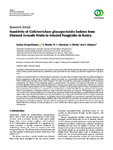Sensitivity of Colletotrichum gloeosporioides Isolates from Diseased Avocado Fruits to Selected Fungicides in Kenya

View/
Date
2018Author
Kimaru, Stanley Kirugo
Monda, E.
Cheruiyot, R. C.
Mbaka, John Gichimu
Alakonya, A.
Metadata
Show full item recordAbstract
Colletotrichumgloeosporioidesisaseriouspostharvestpathogenofavocadofruitsworldwide.Kenyalacksanyregisteredfungicides for the management of the disease. Nevertheless, farmers commonly use commercially available fungicides such as Bayleton 25WP (Triadimefon 250g/Kg), Milraz 76WP (Propineb 70% and Cymoxanil 6%), and Copper oxychloride 500WP for disease management. The efficacy of these fungicides against C. gloeosporioides is not known. The purpose of this study was therefore to test the inhibitory effect of these fungicides against 46 C. gloeosporioides isolates from avocado fruits collected from varieties grown at different agroecological zones in Murang’a County, a popular avocado-growing region in Kenya. Mycelial growth rate and sporulation for each isolate were measuredin vitro on PDA plates amended with different concentrations of the fungicides. Plates were arranged in a completely randomized design with three replications per treatment. All fungicides were effective in vitrobutthereweresignificantdifferencesinsensitivityamongisolates.Bayletonhadthehighestmycelialinhibitionfollowedby Milraz,while copperoxychloride ,ranging from 81%to 88%.However,copper oxychloride wasmoreeffectiveininhibitingsporulation.Theinhibitoryeffectofeachfungicidewasconcentration-dependent,where twice the recommended concentration had the highest inhibitory effect,followed by the recommended concentration.Our results show that the fungicides used by farmers against C.gloeosporioides,the causalagent for anthracnose,are effective.We,however,recommend further field tests in different avocado-growing areas so as to validate their efficacy against various isolates and under different environments
